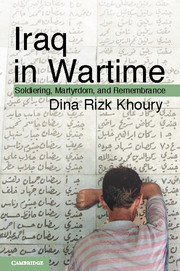Book contents
- Frontmatter
- Contents
- List of Illustrations, Maps, and Table
- Acknowledgments
- Note on Translations and Transliteration
- Maps
- 1 Introduction
- 2 Iraq’s Wars under the Ba‘th
- 3 The Internal Front
- 4 Battlefronts
- 5 Things Fall Apart
- 6 War’s Citizens, War’s Families
- 7 Memory for the Future
- 8 Commemorating the Dead
- 9 Postscript
- Appendix I Distribution in Percentage of Ba‘th Party Members, “Friends of Saddam,” and Martyrs in Fifteen Iraqi Provinces, 1998–1999
- Appendix II Percentage of Ba‘th Party Membership among Matriculating Students (Sixth Secondary) in Ten Iraqi Provinces, 1987–1988
- Appendix III Report Issued by Ali Hasan al-Majid, Head of the Northern Bureau of the Ba‘th Party to the General Secretariat, August 1987
- Sources and Bibliography
- Index
6 - War’s Citizens, War’s Families
Published online by Cambridge University Press: 05 March 2013
- Frontmatter
- Contents
- List of Illustrations, Maps, and Table
- Acknowledgments
- Note on Translations and Transliteration
- Maps
- 1 Introduction
- 2 Iraq’s Wars under the Ba‘th
- 3 The Internal Front
- 4 Battlefronts
- 5 Things Fall Apart
- 6 War’s Citizens, War’s Families
- 7 Memory for the Future
- 8 Commemorating the Dead
- 9 Postscript
- Appendix I Distribution in Percentage of Ba‘th Party Members, “Friends of Saddam,” and Martyrs in Fifteen Iraqi Provinces, 1998–1999
- Appendix II Percentage of Ba‘th Party Membership among Matriculating Students (Sixth Secondary) in Ten Iraqi Provinces, 1987–1988
- Appendix III Report Issued by Ali Hasan al-Majid, Head of the Northern Bureau of the Ba‘th Party to the General Secretariat, August 1987
- Sources and Bibliography
- Index
Summary
Ammar Hasan once estimated that there must be twenty-one levels of citizens’ rights in Iraq:
There are entitlements and privileges that distinguish one citizen from the other. I consider myself, for example, a citizen of the fifteenth degree…. No one of my family was martyred in the war, no one had medals of courage, I don’t have any relatives who were prisoners of war, I do not have any party rank, my father is an independent not a Ba‘thist, neither my family nor I belong to the party. At the same time, I have no one in my family against the regime, no one among my family who is outside the country working with the opposition. According to this logic I am grade fifteen … Because if my daughter applies to college and had a perfect grade average [sic] and the person who competes with her has a father who has a high party rank, or has a medal of courage or has a connection, or is among the Friend of the President, or … or … or…. All these privileges, I have nothing of these.
Ammar’s bitter comment captures three features of Iraqi citizens’ rights during wartime: the proliferation of categories that determined access or denial of citizens to entitlements, the importance of martyrdom and soldiering in bestowing privileges, and the primacy of family in the assignation of rights.
At the onset of the Iran-Iraq war, Iraq’s political leadership found that it had to rework the legal and administrative infrastructure of the system of privileges and exclusion that had underpinned citizens’ rights in the Ba‘thist state. Starting in October 1980, to garner support for the war, the Revolutionary Command Council (RCC) enacted a series of laws intended to reshape the rights of soldiers and martyrs by elevating both to favored citizens’ status and granting them privileges formerly reserved to Ba‘th Party members.
- Type
- Chapter
- Information
- Iraq in WartimeSoldiering, Martyrdom, and Remembrance, pp. 161 - 180Publisher: Cambridge University PressPrint publication year: 2013

